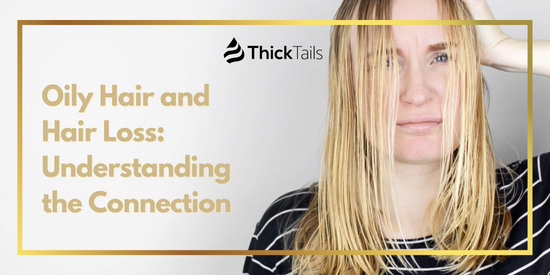Hair loss is a common concern for men around the world. The age-old adage that baldness is passed down through the mother's side of the family is not just a trope; there's a deep, genetic component to receding hairlines and the onset of baldness in men. In this comprehensive guide, we'll explore the genetic predisposition to hair loss, strategies for managing this natural phenomenon, and peek into the future of genetic treatments that could revolutionize how we address male pattern baldness.
I. Understanding the Genetic Basis of Male Hair Loss

Hair loss in men can often feel like a battle against one's own genes. The primary culprit behind this condition is dihydrotestosterone (DHT), a derivative of testosterone, which can lead to the shrinking of hair follicles and eventually result in thinning hair or baldness. While genetics play an indisputable role in determining susceptibility to hair loss, understanding the specifics can empower men to seek appropriate treatments and interventions.
Overview of Male Pattern Baldness
Male pattern baldness, clinically known as androgenetic alopecia, is the most common form of hair loss in men, affecting a significant portion of the male population at various stages of life. This condition is largely influenced by genetic factors and the body's sensitivity to DHT. Early recognition and a clear understanding of one's genetic risk can be crucial in effectively managing and potentially mitigating the impacts of hair loss, offering men various avenues to retain or restore their hair.
Genetic Factors Contributing to Hair Loss
The primary gene related to androgenetic alopecia is the androgen receptor gene on the X chromosome. Variations in this gene can increase the risk of hair loss, but it's not the only genetic factor at play. Researchers have also identified other genes associated with alopecia that are involved in hair follicle formation and maintenance.
Identifying Genetic Predisposition to Hair Loss
Genetic testing for male pattern baldness is not common practice. However, family history remains the best indicator of a man's predisposition to baldness. Still, advancements in DNA testing are allowing individuals to uncover their propensity towards certain genetic inherited traits, including hair loss.
II. Managing Genetic Hair Loss
To effectively manage genetic hair loss, many men turn to specialized hair care products. Choosing the right shampoo and conditioner formulated for thinning hair can make a significant difference in maintaining the health of the scalp and minimizing hair loss. Additionally, incorporating a hair serum designed to stimulate hair growth and strengthen hair follicles can further support men in combating the effects of androgenetic alopecia. Together, these products form a crucial line of defense for men facing the challenges of genetic hair loss, offering hope and practical solutions for managing this common condition.
Lifestyle Changes and Their Impact
Lifestyle factors can sometimes exacerbate the genetic predisposition to male hair loss. High-stress levels, smoking, and a sedentary lifestyle can potentially accelerate the onset of baldness. Therefore, implementing stress-reduction techniques, quitting smoking, and ensuring regular exercise can play a part in slowing the progression of hair loss.
Dietary Considerations and Nutritional Support
A well-balanced diet is paramount for men grappling with hair loss, as certain vitamins and minerals play a significant role in maintaining healthy hair growth. Integrating foods rich in iron, zinc, and vitamins E and B can fortify hair follicles from within. In tandem with using specialized shampoo and conditioner aimed at thinning hair, and applying hair serum designed to invigorate scalp health, these dietary adjustments can substantially aid men in mitigating the effects of hair loss. This holistic approach underscores the synergy between topical treatments and internal nutritional support in combating the challenges of genetic hair thinning.
Integrating Natural Remedies and Treatments
Natural remedies such as applying rosemary oil, using caffeine-based shampoos, and massaging the scalp with essential oils might have mild to moderate effects in promoting hair growth and strengthening hair. Scalp microneedling is another non-invasive treatment that can stimulate hair follicles.
III. Future Prospects and Innovations in Genetic Hair Loss

The landscape of solutions for combating hair loss in men has vastly expanded, with innovations in shampoo and conditioner formulations, hair serums, and comprehensive treatments geared towards addressing the genetic aspects of male pattern baldness. Products enriched with ingredients that target the health of the scalp and the reinforcement of hair strands are at the forefront of this battle. By integrating specialized shampoos and conditioners designed to prevent thinning alongside potent hair serums aimed at revitalizing follicles, men now have an effective arsenal at their disposal to combat the signs of genetic hair loss.
Emerging Therapies and Research
Ongoing studies are evaluating the effectiveness of stem cell treatments, platelet-rich plasma therapy, and low-level laser therapy in treating hair loss. These therapies are still in the early stages, but the initial findings are promising.
Potential Genetic Treatments on the Horizon
Genetic treatments like gene therapy and gene editing tools such as CRISPR hold the potential for eradicating the genetic roots of male pattern baldness. While these techniques are currently experimental, they offer a future where genetic predisposition to baldness might be alterable at the source.
In the ongoing battle against hair loss in men, the synergy between high-quality shampoo and conditioner specifically designed for thinning hair and potent hair serums cannot be overstated. These products form a foundational aspect of daily hair care routines aimed at mitigating the effects of male pattern baldness. By nourishing the scalp and strengthening hair follicles, men are better equipped to manage genetic hair loss, preserving both the health and appearance of their hair. This comprehensive approach underscores the importance of targeted hair care solutions in addressing the challenges presented by androgenetic alopecia.
Lifestyle Practices for Healthy Hair Maintenance
Even with the prospect of genetic treatments, good hair care remains crucial. This includes using gentle shampoos and conditioners, avoiding harsh hair treatments, protecting hair from UV rays, and keeping the scalp clean and healthy.
In conclusion, male hair loss is a complex interplay of genetic and environmental factors. While we cannot pick our genetic cards, there is a range of strategies available to men to manage their hair health. From lifestyle changes to emerging genetic treatments, the future looks promising for addressing male pattern baldness.














